Are you struggling to hire the right people for your startup without draining your budget? You’re not alone! Recruitment remains one of the most pressing challenges for young businesses.
In fact, research shows that 23% of startups fail due to the wrong team, whether it’s skills gaps, disagreements between founders, or poor hiring decisions. For startups with limited resources and high competition, building a strong team is not just important, but a matter of survival.
That’s where affordable recruiting solutions for startups can make a real difference. In this blog, we explore the top tools, features to prioritise, and tips to help you build a winning team without stretching your resources.
Overview:
- Startups struggle with hiring challenges, including limited resources, competition, and cultural fit requirements.
- Recruitment software simplifies hiring by streamlining workflows, sourcing candidates, and improving team collaboration.
- Key features to prioritise include broad talent networks, smart sourcing, analytics, and ease of use.
- Top affordable recruiting solutions for startups include Tidyhire, Workable, LinkedIn, Indeed, and Greenhouse.
- Choosing the right solution depends on hiring needs, budget, scalability, and platform usability.
Key Hiring Challenges Startups Face
Starting a business means building a team that shares your vision, but recruitment often brings unique hurdles. Here are the most common hiring challenges that can slow down your growth:
- Limited Resources: Startups often lack the financial flexibility of larger firms, making traditional recruitment methods costly. Affordable recruiting solutions for startups offer cost-effective alternatives to connect with wider talent pools.
- Intense Competition: Larger companies attract talent with higher salaries and benefits. Startups must stand out by emphasising growth opportunities and culture to win over candidates.
- Cultural Fit and Team Dynamics: In close-knit teams, finding individuals who share the company’s vision is crucial. Startups must evaluate both technical skills and cultural alignment to build strong, collaborative teams.
To address these challenges, recruitment software and online hiring platforms have become indispensable.
Also Read: Top 10 Common HR Challenges and Solutions in 2025
How Recruitment Software Simplifies Hiring For Startups?
Modern recruitment tools allow you to hire smarter while saving both time and costs. These platforms are built to address the very barriers that slow down hiring for small businesses.
- Expanding Candidate Reach: Recruitment platforms extend your reach beyond your local market. By connecting you with candidates worldwide, they bring in diverse skills, backgrounds, and fresh perspectives that can strengthen your team.
- Cost-Effective Hiring Options: Many platforms offer flexible pricing plans that scale with your needs. Instead of overspending on traditional hiring, you can choose models that fit your budget and still reach quality candidates.
- Better Candidate Experience: A smooth, transparent application process leaves a lasting impression on candidates. From simplified job applications to timely updates, recruitment software helps position your startup as an attractive and professional employer.
With clear benefits like these, it’s equally important to know what features matter most when comparing affordable recruiting solutions for startups.
Also Read: AI-Driven Recruitment Automation: Enhancing Hiring Processes
What Features To Look For In Recruitment Software?
The right platform can make or break your hiring success. Rather than focusing on flashy add-ons, you should prioritise features that improve efficiency and make your recruitment process easier. Look for:
Wide Professional Network:
A strong hiring platform must connect you to a large pool of professionals across industries and experience levels. This diversity not only broadens your reach but also boosts creativity, giving you access to fresh perspectives and hidden talent pools.
Efficient Candidate Sourcing:
Time is critical for startups, and efficient sourcing features are non-negotiable. AI-driven matching and smart filters help surface candidates who closely match your job needs, keeping your pipeline filled with quality applicants.
Multi-Channel Compatibility:
Reaching candidates through multiple touchpoints is vital. Your job posts should appear wherever candidates are most active. The best recruitment software integrates with job boards, social platforms, and niche industry channels, giving your openings wider exposure.
Recruitment Analytics:
Without reliable data, it’s hard to improve hiring strategies. Recruitment analytics provide insights into ad performance, sourcing effectiveness, and candidate pipelines. These reports empower you to refine processes, measure ROI, and ensure your hiring decisions are backed by evidence.
Now that you know which features matter, the next step is choosing wisely among available options.
10 Best Affordable Recruiting Solutions For Startups
Hiring the right people is never easy when you’re building a team from scratch. That’s why we’ve put together this list of affordable recruiting solutions for startups. Use it as a quick guide to compare your options.
Here’s a head-to-head comparison of the top 10 tools:
1. Tidyhire
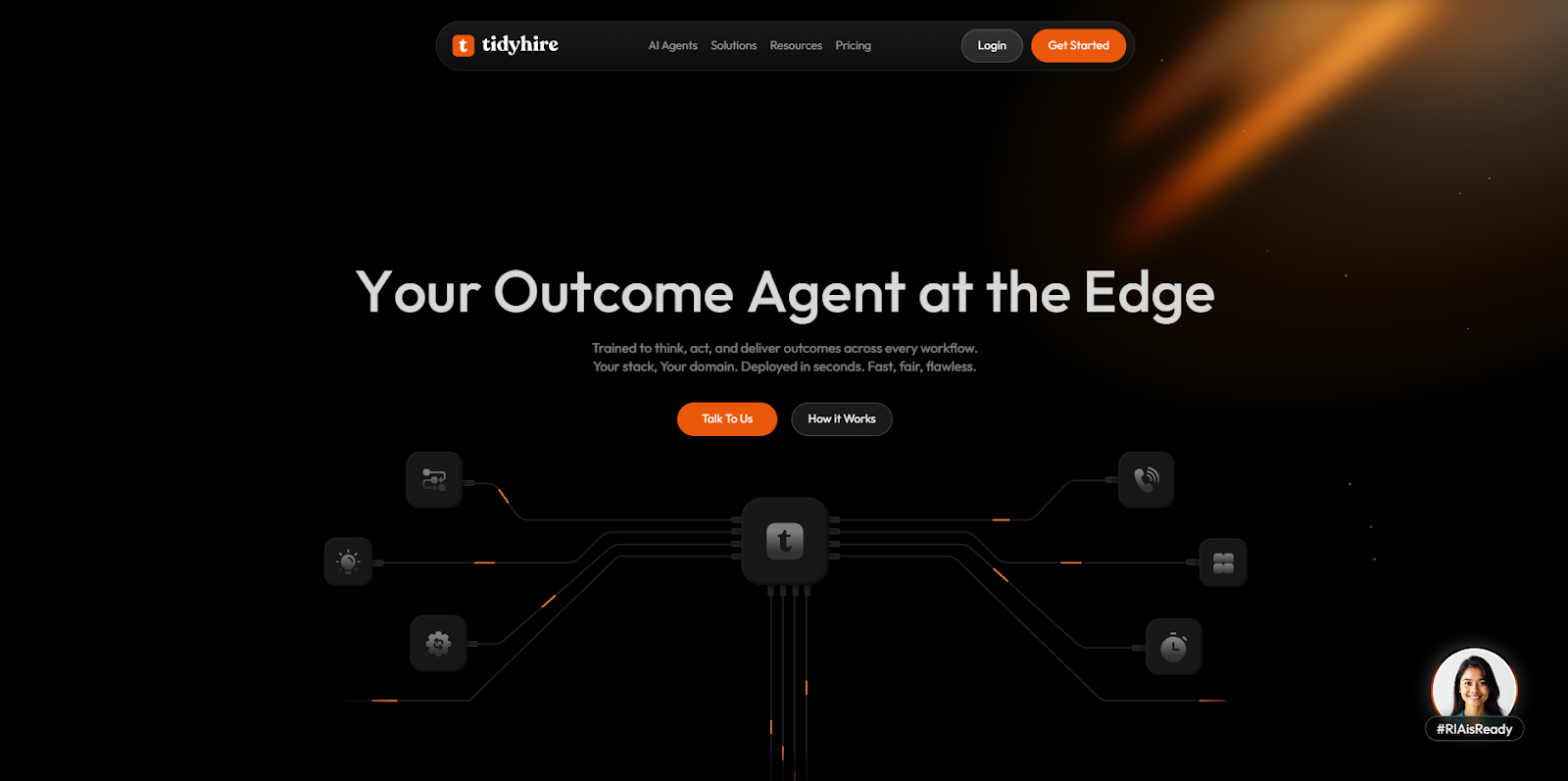
Topping our list is Tidyhire, built to simplify outbound hiring for startups. With AI-powered tools like RIA and Charlie, it automates sourcing, follow-ups, and first-round interviews. This makes it easier for you to scale hiring while focusing on meaningful candidate connections. It’s one of the most advanced, affordable recruiting solutions for startups today.
Standout Features
- Automates sourcing and follow-ups using AI-driven workflows tailored for outbound hiring teams.
- Provides real-time candidate assessments with bias-free evaluations through structured interviews.
- Supports 32 languages for seamless candidate engagement in global hiring campaigns.
- Integrates with 300+ tools, including Slack, Teams, ATS, and CRM platforms.
Pros: Saves recruiters significant time by automating sourcing, screening, and communication.
Cons: Advanced AI features may require training for smaller teams.
2. Workable

Workable is another strong choice for startups wanting a straightforward hiring solution. This ATS handles everything from job postings to offers in one place. With wide job board distribution, collaboration tools, and detailed reporting, it helps your team hire efficiently while staying organised throughout the process.
Standout Features
- Distributes job postings across 200+ boards, boosting reach and improving candidate visibility.
- Offers collaborative hiring tools where your team can share notes and feedback instantly.
- Provides detailed reports and analytics to track hiring efficiency and optimise recruitment strategies.
- Comes with a mobile app so recruiters can manage hiring anytime, anywhere.
Pros: Easy-to-use platform with strong collaboration features that improve team-based hiring decisions.
Cons: Lacks direct integration with virtual conferencing tools like Zoom for seamless interviews.
3. LinkedIn
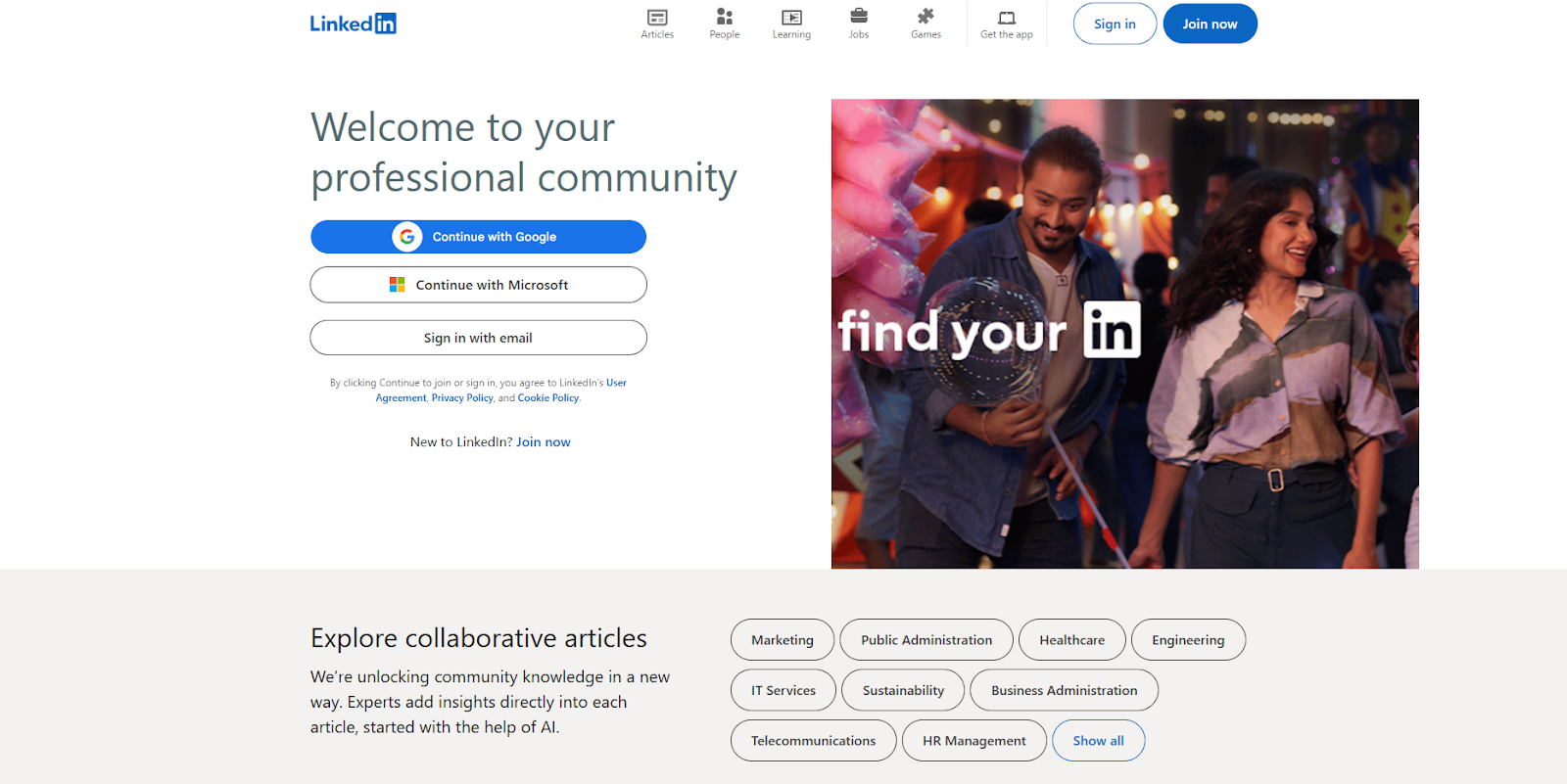
LinkedIn is a trusted platform for professional networking that doubles as a powerful recruiting tool. With its huge candidate base and advanced filters, you can source top talent across industries. LinkedIn Recruiter provides detailed applicant insights, helping you evaluate candidates more strategically and connect with them directly.
Standout Features
- Advanced search filters to find candidates with specific skills, roles, or industry experience.
- Personalised InMail messages with templates to engage candidates quickly and effectively.
- Collaboration tools to manage pipelines and share shortlisted profiles with your team.
- Comprehensive applicant insights for better-informed recruiting decisions.
Pros: Access to an extensive candidate database with advanced search and personalised outreach options.
Cons: Subscription costs can be high compared to other recruiting platforms.
4. Indeed
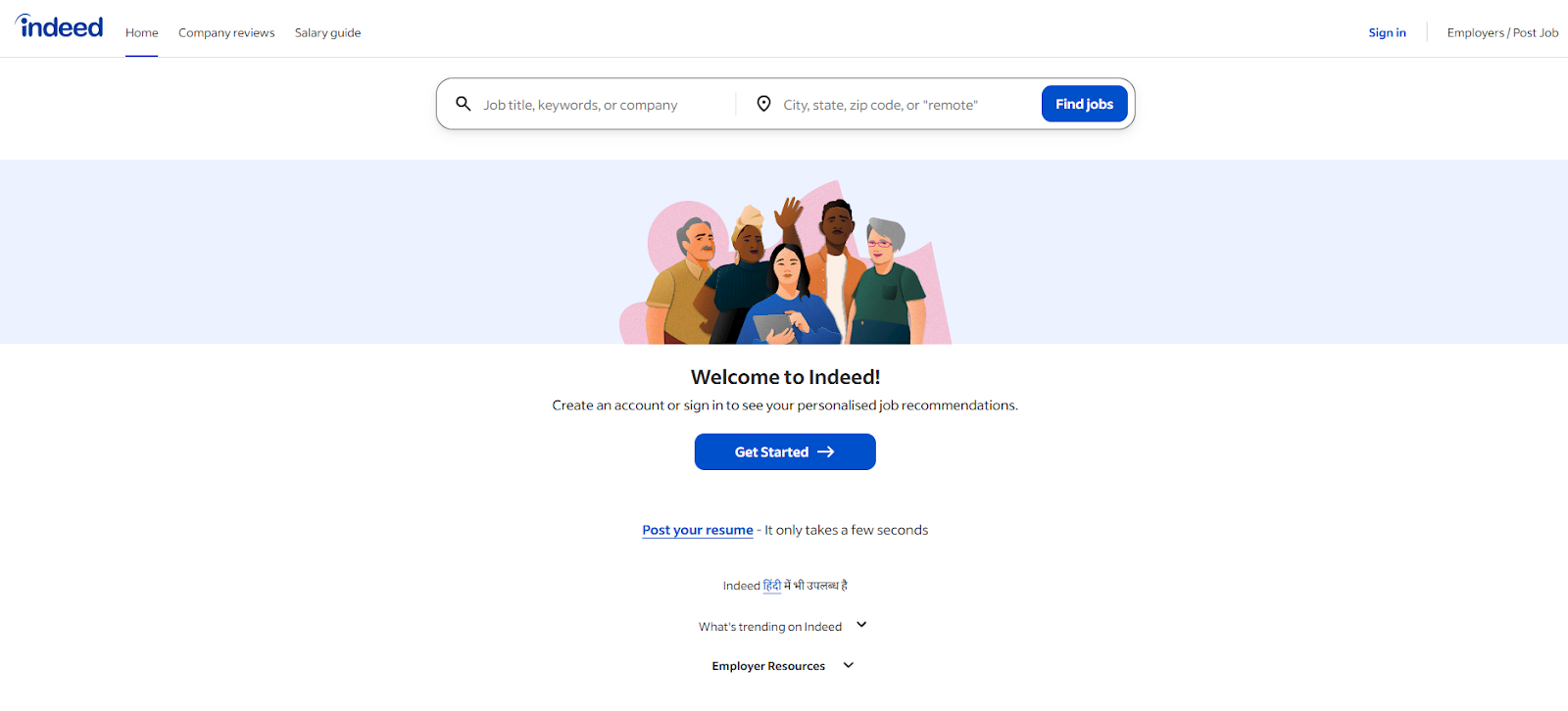
Indeed is another strong contender in the recruitment space, offering one of the largest job search engines worldwide. With millions of active users, it’s a cost-effective platform for startups looking to increase visibility and attract candidates at scale. Sponsored listings further boost exposure for critical roles.
Standout Features
- Sponsored job ads that improve visibility with a pay-per-click model for high-priority roles.
- Resume search tool offering access to millions of candidate profiles globally.
- AI-driven pre-screening questions to filter applicants before reviewing CVs.
- Real-time analytics to track ad performance and cost efficiency.
Pros: Large talent pool makes it easy to reach candidates across diverse backgrounds.
Cons: High applicant volume may result in irrelevant or unqualified applications.
5. Greenhouse
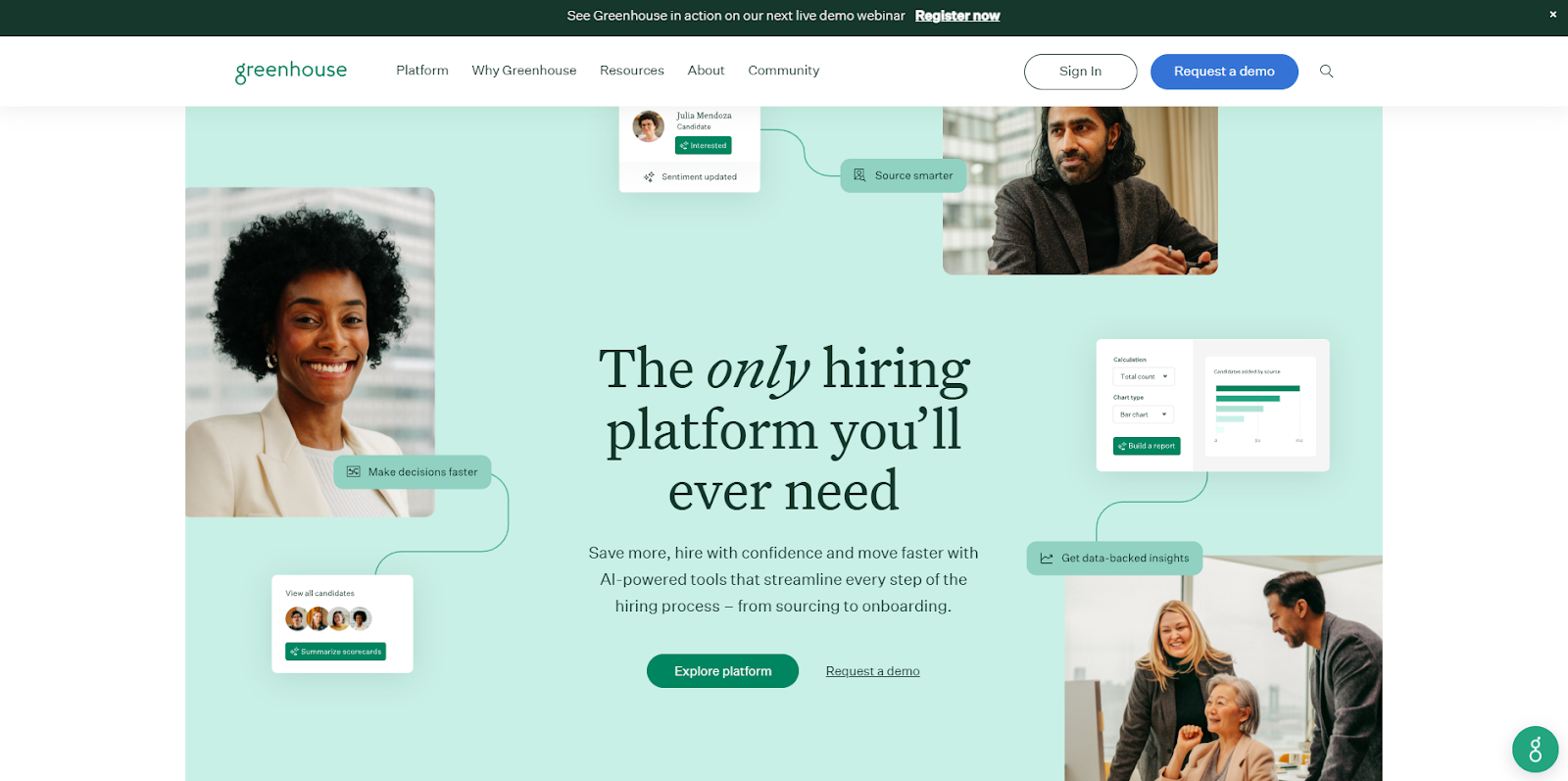
Greenhouse is a well-known ATS that’s worth considering if you want scalable hiring processes. Designed for growing businesses, it provides advanced customisation, structured pipelines, and strong reporting features. Its collaboration tools also make it easier for teams to evaluate candidates and move them through the process efficiently.
Standout Features
- Customisable hiring pipelines and workflows for different roles and teams.
- Advanced reporting to track metrics like time-to-hire and source effectiveness.
- Integrated interview scheduling and collaborative scorecards for better decision-making.
- Connections with over 200 HR tools, background checks, and onboarding apps.
Pros: Robust analytics provide deeper insights into recruitment effectiveness and hiring bottlenecks.
Cons: Setup can be complex, requiring more administrative effort for small teams.
6. Glassdoor
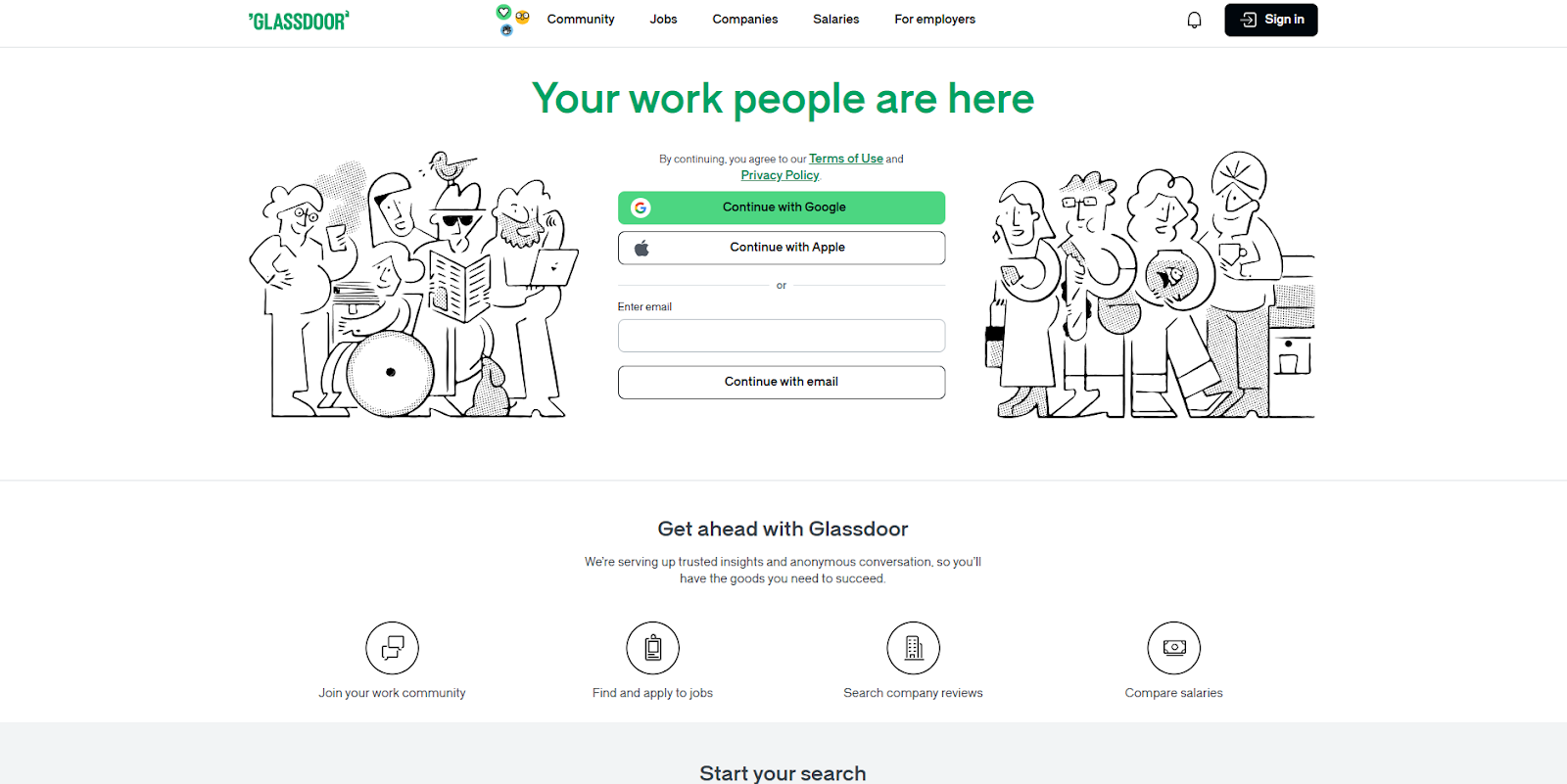
Glassdoor is especially effective if you want to focus on employer branding alongside recruitment. It allows startups to showcase company culture, values, and employee reviews to attract like-minded candidates. With its connected job board, your roles gain additional visibility while strengthening your employer brand in the market.
Standout Features
- Employer branding tools to highlight culture, values, and workplace experiences.
- Company and interview reviews for candidates to understand your work environment better.
- Analytics and insights to assess brand perception and improve employee experience.
- Bundled hiring solutions with Indeed for extended candidate reach.
Pros: Excellent for promoting your brand and attracting candidates aligned with company culture.
Cons: More expensive than other platforms with a comparatively smaller candidate pool.
7. JazzHR
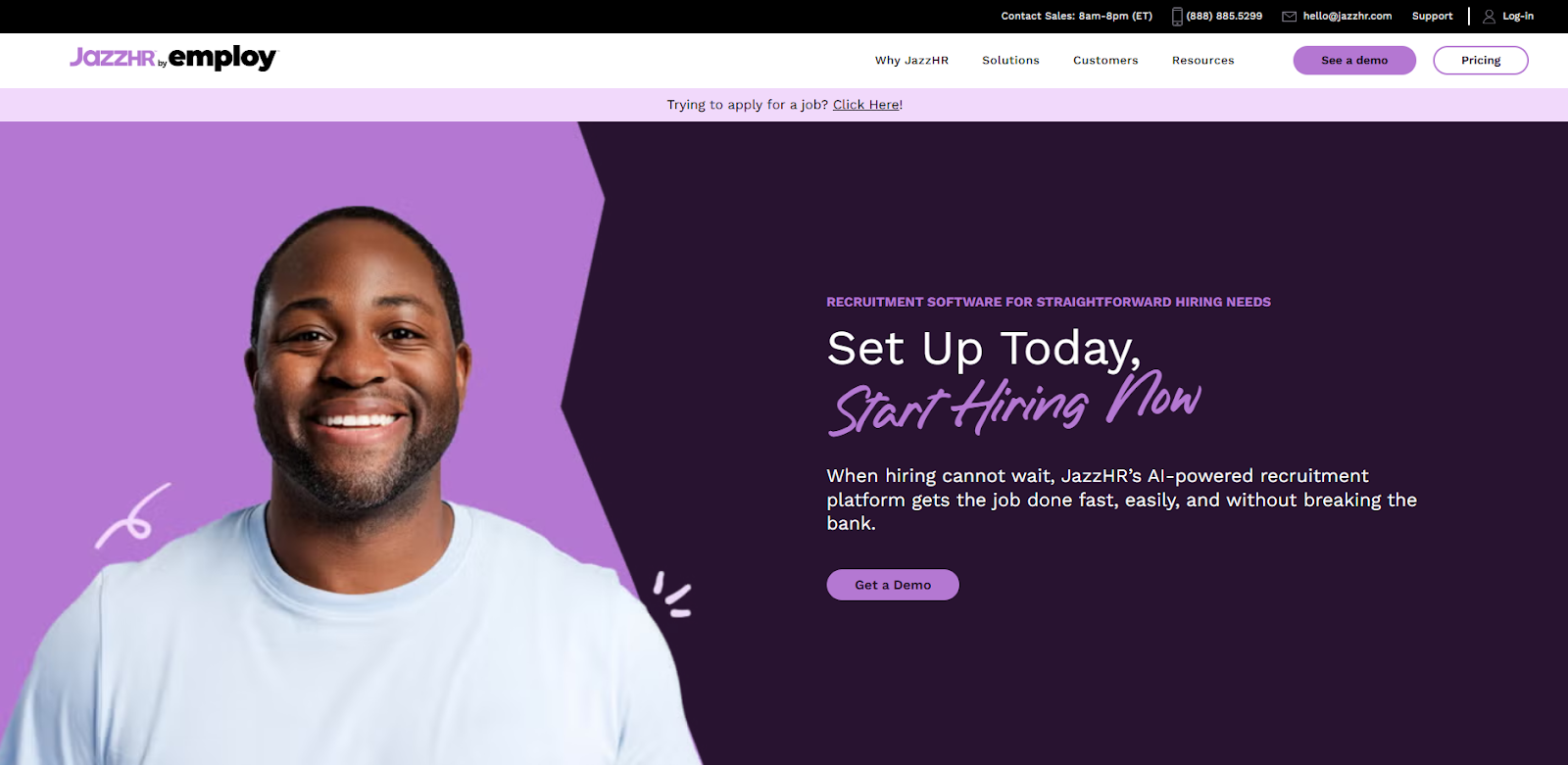
JazzHR is a user-friendly ATS built with startups in mind. It simplifies hiring with easy workflows, job distribution, and resume parsing, making it suitable for teams without dedicated HR staff. If you want straightforward functionality without heavy costs, JazzHR is a reliable option.
Standout Features
- Post jobs across multiple boards while managing applications in one central dashboard.
- Automated resume screening and ranking to save recruiters time during evaluation.
- Customisable hiring workflows for flexibility across different job roles.
- Collaborative feedback features that make team-based decisions easier.
Pros: Simple interface and accessible pricing make it ideal for smaller startups.
Cons: Reporting tools can be difficult to use and extract insights from.
8. ZipRecruiter
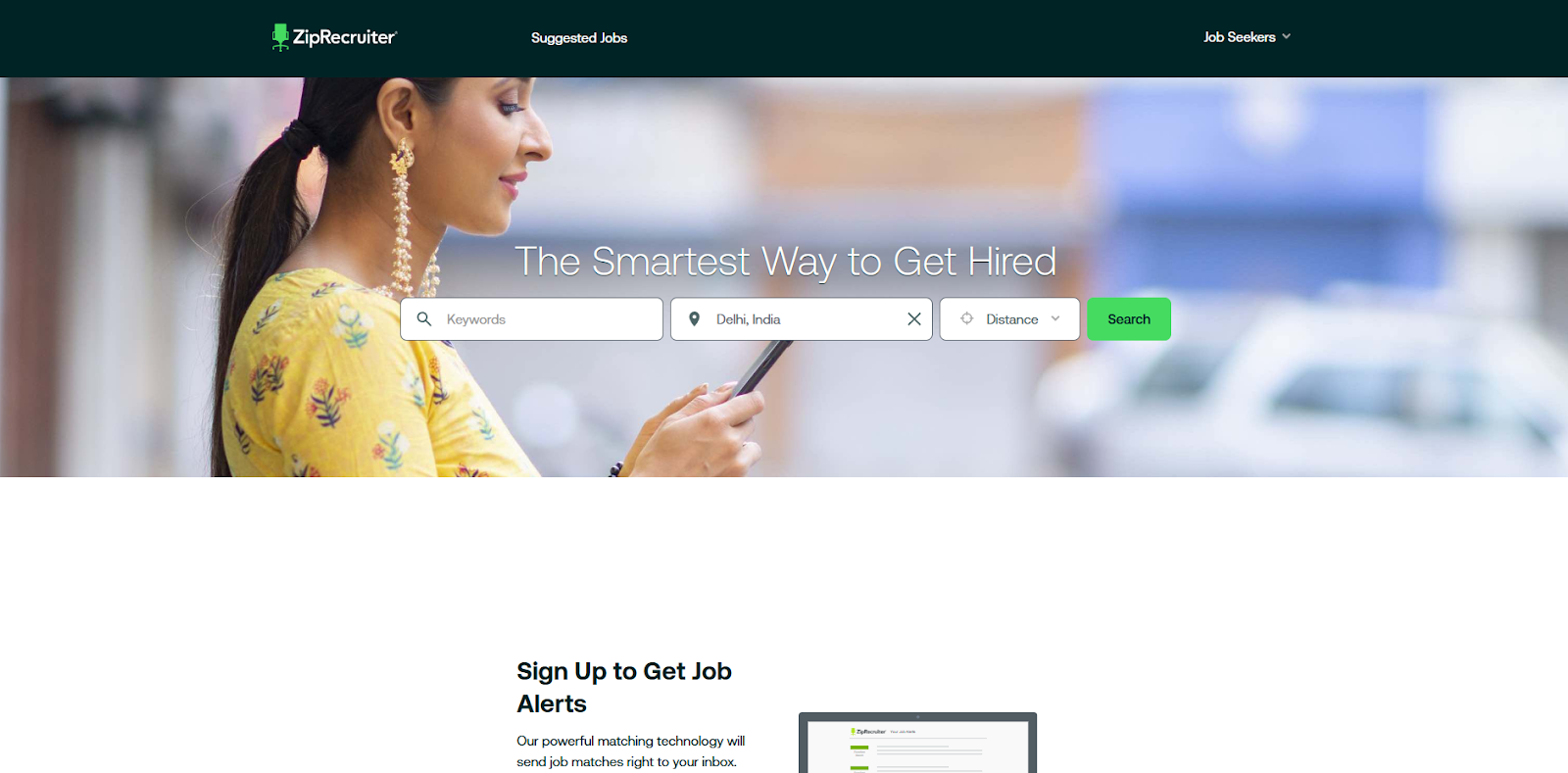
ZipRecruiter stands out for its wide distribution network. With a single posting, your job is shared across multiple boards and platforms, increasing visibility instantly. Its smart matching technology connects you with candidates who closely match your role requirements, making the process faster and more efficient.
Standout Features
- One-click job distribution across numerous boards and social media channels.
- AI-powered candidate matching that delivers relevant profiles quickly.
- Mobile-friendly design for recruiters and candidates to connect on the go.
- Premium customer support with options for phone, email, or live chat.
Pros: Expands candidate reach significantly with broad job posting distribution.
Cons: Pricing may be higher than alternatives, especially for smaller startups.
9. Lever
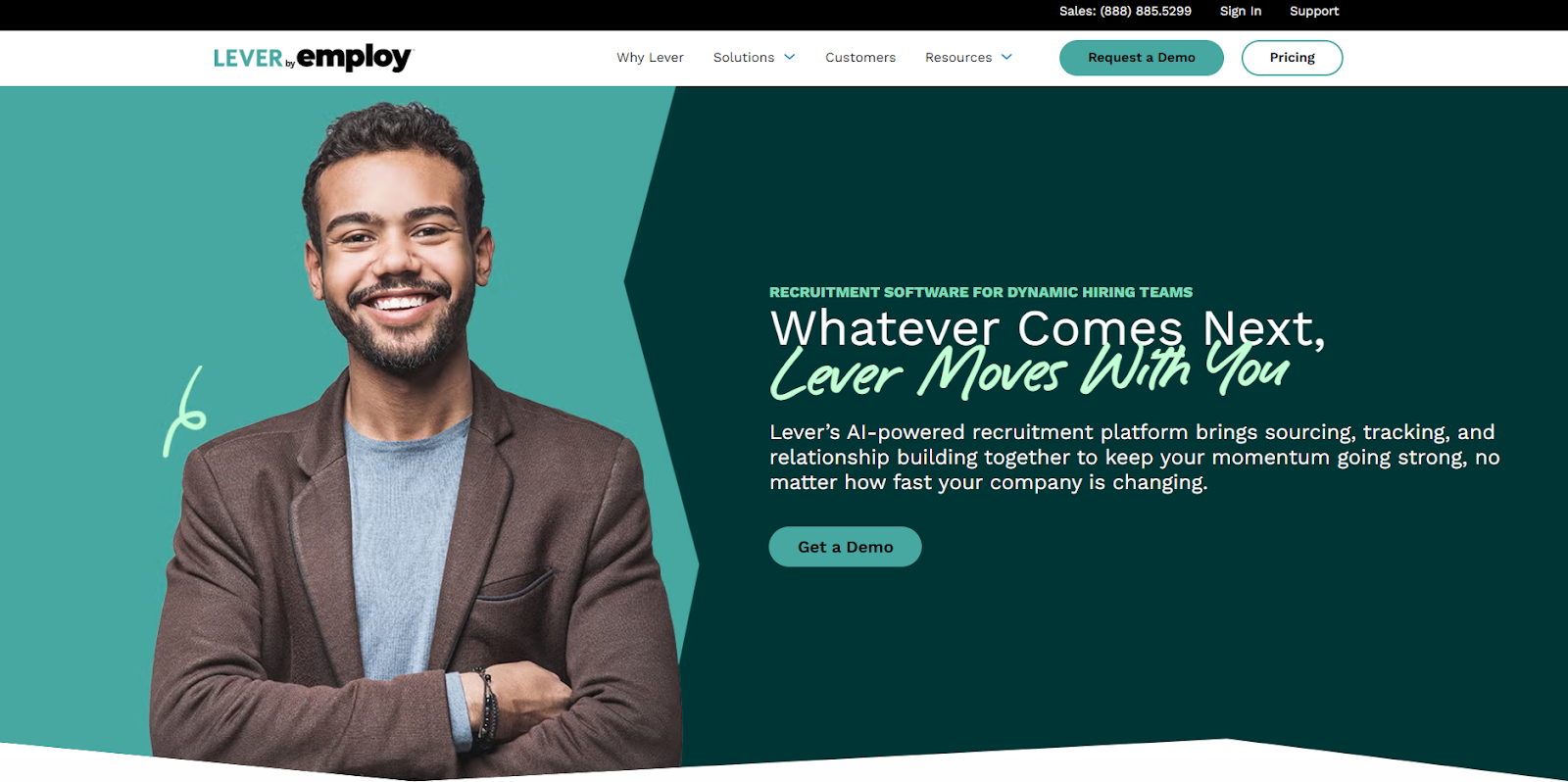
Lever is another ATS designed to make collaboration seamless during hiring. It offers strong integration options, advanced workflows, and AI-driven support to keep recruitment structured and efficient. Its reporting and automation features help growing businesses manage high volumes of applicants without losing quality in the process.
Standout Features
- Flexible workflows and collaborative hiring pipelines tailored for team decision-making.
- AI-powered tools to standardise interviews and reduce bias during evaluations.
- Recruitment marketing features that help attract candidates more effectively.
- In-depth recruitment analytics for better long-term hiring strategies.
Pros: Collaboration-friendly design with robust reporting and automation features.
Cons: Advanced features may feel overwhelming for smaller businesses without HR expertise.
10. SmartRecruiters
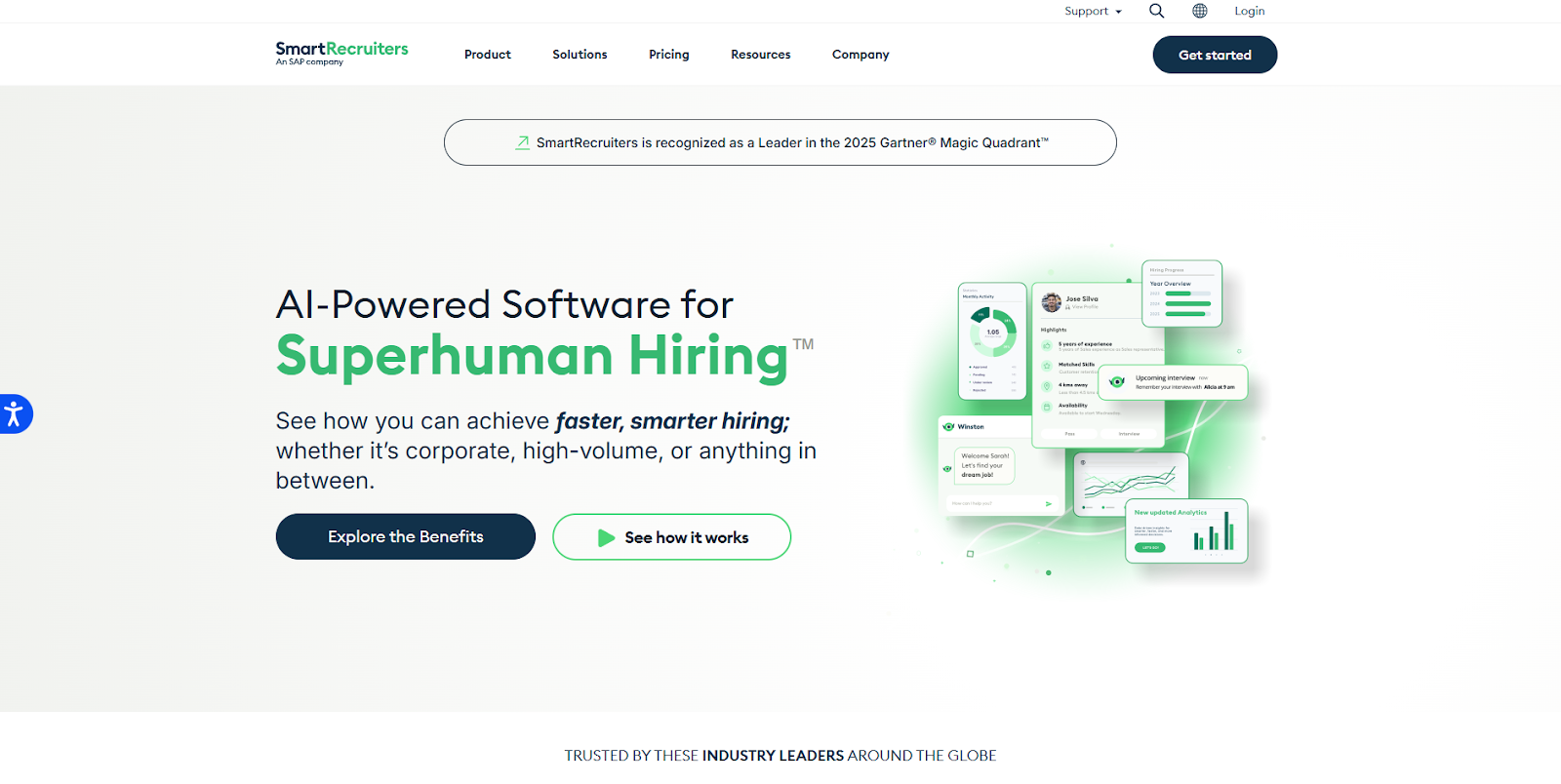
Rounding off our list is SmartRecruiters, a cloud-based recruitment platform built for ease of use. It allows collaborative hiring, integrates with a wide range of HR tools, and uses AI-driven candidate matching. Startups benefit from its scalability and intuitive interface, making it simple to manage hiring end-to-end.
Standout Features
- End-to-end hiring platform covering job postings through onboarding processes.
- AI-driven insights to help recruiters shortlist candidates faster and more accurately.
- Marketplace integrations with popular HR and workforce management platforms.
- Cloud-based design enabling collaboration across multiple team members and devices.
Pros: Intuitive interface makes it easy for startups to onboard and use immediately.
Cons: Advanced functionality may require extra costs, which can add up quickly.
Also Read: Best Enterprise Recruitment Automation Software 2025
How To Choose The Best Recruiting Solution For Your Startup?
Choosing the right recruitment software means aligning a platform with your hiring needs, budget, and long-term vision. A structured approach ensures you don’t overspend or overlook crucial features. Here’s a step-by-step guide to make the right call:
Define Your Hiring Needs
Start with clarity. Estimate how many people you’ll need to hire over the next 6-12 months and identify your main bottlenecks, whether it’s sourcing candidates or tracking communication. When you know your pain points, it becomes easier to select a solution that addresses them directly.
Balance Pricing and Scalability
Budget constraints are a reality for most startups. Instead of going for enterprise-grade systems that offer more than you’ll use, look for affordable recruiting solutions for startups with flexible pricing models. Choose software that allows you to start small but can scale as your team and hiring needs expand.
Evaluate Core Features
Prioritise features that reduce workload and improve outcomes. These include automation (to save time), job board and social media integration (to widen your reach), and recruitment analytics (to track performance and improve). These essentials ensure that your hiring remains efficient without adding unnecessary complexity.
Ease of Use and Support
Even the most powerful software can fall flat if your team struggles to use it. Make sure the platform has a simple, intuitive interface that your hiring managers can learn quickly. Also, check the quality of customer support. Responsive service can make a huge difference when you’re under pressure to fill roles fast.
Research User Feedback
Don’t rely solely on sales pitches. Platforms like G2, Capterra, and Trustpilot provide unbiased reviews from other startups. Pay attention to comments about system reliability, customer service, and the actual effectiveness of features. Case studies from similar-sized companies can also give you a clearer picture of how the solution performs in real-life startup environments.
Test With Free Trials
Almost all recruitment platforms offer free trials or demo versions. Use these to simulate your hiring process. Post a sample job, test communication features, and run through reporting tools. This hands-on testing is the best way to see if the solution fits your workflow before committing financially.
Think Long-Term
Choose software that won’t just solve today’s hiring needs but will also support future goals, such as international recruitment, advanced analytics, or employer branding. A future-ready tool saves the hassle of switching later.
Also Read: Hiring Your First HR Person for a Startup: Essential Tips
Final Thoughts
Hiring is never straightforward for startups, but recruitment software makes the process more structured. Making the right choice comes down to understanding your hiring needs, setting a clear budget, and focusing on features that deliver value. By following a step-by-step approach, you’ll be able to identify affordable recruiting solutions for startups that save time, reduce costs, and help you secure the right talent.
For startups seeking efficiency without complexity, Tidyhire stands out as a smart choice. Its AI-driven tools help you source candidates from a vast network, personalise outreach at scale, and remove repetitive tasks from your plate. More importantly, it offers affordability without compromising on quality, helping you attract the right talent quickly and efficiently.
Ready to find the right talent faster? Get started with Tidyhire’s free demo today and experience how these solutions can streamline your hiring efforts.
FAQ’s
What’s the best recruiting app for small businesses?
The ideal recruiting app depends on factors like company size, hiring goals, and budget flexibility. Some businesses prefer advanced automation, while others prioritise simple workflows. Tools such as Tidyhire offer a balanced option, especially for growing startups.
How much does AI recruiting software cost?
AI recruiting software pricing varies widely depending on features, integrations, and scale. Plans typically start around $100 per month, with advanced packages costing several thousand annually. Costs shift as your hiring needs expand or contract.
Which recruitment method is considered one of the least expensive?
Cost-efficient recruitment often comes from employee referrals, job boards, or posting through social media channels. Networking events and university partnerships also provide affordable ways to connect with qualified candidates without straining startup budgets.
What is ATS?
An applicant tracking system (ATS) is recruitment software that helps manage applications, screen candidates, and streamline workflows. It reduces manual effort, organises candidate data, and ensures recruiters spend more time on meaningful hiring decisions.

